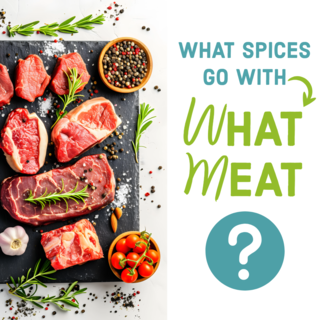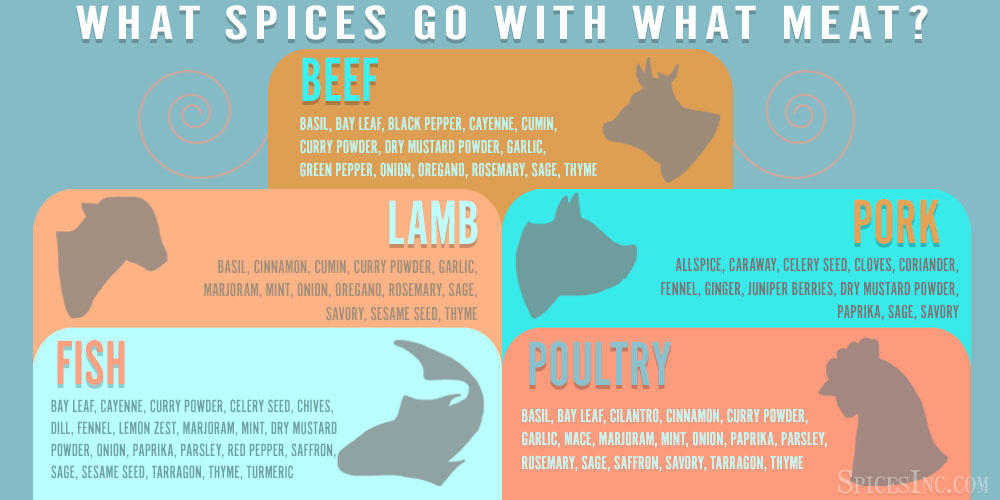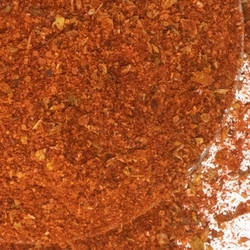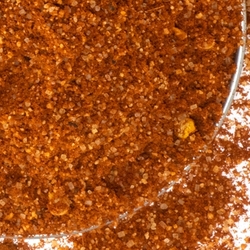What Spices Go with What Meat?

What Spices Go With What Meat
When you don’t know how to cook something, even the simplest attempt at dinner can seem daunting. A perfectly seasoned meal can become the star of the evening, and even provide leftovers for most of the week. Meat, often the keystone around which meals are built, comes to the table with an inherent flavor profile and you have to choose the right spices for meat to make a delicious meal happen. At first glance, it can seem like one of the hardest things to get down, but these flavor suggestions can help you realize that no matter your level of experience in the kitchen, you can make some incredibly flavorful meals.
Table of Contents
But First…Where’s the Salt?
Because of the ubiquitous nature of salt, we didn’t include it in any of our entries below, but we’d happily sprinkle it on all of the meats we discuss. Using salt properly during cooking can be a little tricky, and sometimes it’s almost more chemistry than anything else. Read When and How to Use Salt During Cooking to learn more about how to salt your food for the best and most delicious results.

What Spices Go with Beef?
When you cook with beef, you want herbs and spices that can stand up for themselves. These are flavoring agents that have a pronounced flavor of their own and complement the strong flavor of beef without becoming overwhelmed by it. According to the University of Illinois, beef consumption declined from 97 pounds per capita in 1999 to 83 pounds in 2020. Beef can come in many different forms and cuts. Whether you’re looking for seasonings for steak, ground beef, or chuck roast, you have to consider that they all have robust but unique flavor profiles. What you like with one cut of beef might not go as well with another. Also, take a few moments to think about what foods you will be serving with the beef and use that as a starting point for your selection of herbs and spices.
- Spices like onion and garlic, with their inherent pungency, are some of the first that comes to mind when it’s time to season the beef. They are savory and strong, and also easy to come by!
- Black Pepper goes wonderfully with beef, with its slightly hot bite and the piney aroma.
- Cayenne is a terrific spice to use with beef. It is hot but not too hot, so it works with the strong flavor of the meat instead of against it. You’ll get a great little peppery kick without mouth-searing heat, and since Cayenne doesn’t have a very strong flavor outside of the heat, you can let other flavoring agents shine.
- Sage is fragrant and warm, adding a little bit of herbal flair to even the simplest of beef-based dishes.
- Thyme is frequently used with beef because it has the ability to round out the flavor of the meat with its lemony notes.
- Yellow Mustard Powder delivers a pungent, sharp flavor that’s great with grilled burgers. Mix some into ground beef before grilling for an especially deep flavor.
- Dried Green or Red Bell Pepper are fantastic with beef. They are excellent in marinades because they rehydrate and their sweet, vegetal flavor seeps into the surrounding liquid.
- For Mediterranean inspired beef dishes, Oregano is the herb of choice. It is earthy and strong and stands up to beef easily. Just be sure to add it to the beef dish toward the end of the cooking time, as oregano loses flavor quickly once exposed to heat.
- Star Anise is sweet and has warming qualities, and pairs beautifully with beef and onions in a braise or stew. Use sparingly and taste the dish as it cooks; Star Anise will contribute its flavor to a braise or stew as long as it’s in the mix, so when you feel that you’ve got enough Star Anise flavor in your food, remove the pods so it won’t overwhelm your dish.
You can mix and match these seasonings into a terrific variety of blends that cater to your personal tastes. Or, you can try one of our ready-to-use seasoning blends for beef and enjoy the gourmet flavor with a few shakes of a measuring spoon.
Tender and delicate veal meat comes from young cows that are raised specifically for that purpose. The herbs and spices that go with beef tend to align with veal as well, though you can also use some lighter spices and herbs and create a brighter flavor profile.
- Parsley has a verdant, airy herbaceousness that tastes lovely with veal.
- Marjoram delivers a light, pepper-mint flavor and matches up with veal nicely.
- Try Lemon Peel for a bright, citrusy flavor adds a refreshing pop to a good veal marinade or spice rub.
- White Pepper’s clean, pine flavor and mellowed pepper bite make it wonderfully suited for veal.
- Basil has a fresh, licorice-meets-pepper flavor that goes beautifully with delicate veal. Add at the end of cooking time because basil loses flavor very quickly when it’s exposed to heat.
These herbs and spices are only some of the ones we would recommend with beef and veal. You can mix and match your favorite spices to make your own unique blend, or try one of our preblended seasonings that are best suited for beef.
What Spices Go with Pork?
Pork is an interesting meat. It's not overpoweringly flavorful like beef, but it's not exactly a blank slate like chicken. It is somewhat sweet, but overall, it’s a beautifully savory food. Pork can sometimes be used as a replacement for beef. While there is some overlap in what spices are compatible with both pork and beef, there are other herbs and spices that pair better with pork than they do with beef.
- Juniper Berries are sweet, tart, and sharp with a hint of pine and play well with the sweetness of pork. A cherry and juniper jam tastes excellent with pork chops or hams.
- Cinnamon and pork are a good match because the cinnamon is sweet but also offers terrific depth. It's a good flavor combination, especially if you are cooking a pork dish that incorporates apples as well. The three flavors marry nicely.
- Allspice is that spice that's reminiscent of the holidays, but it's terrific with savory food and delicious on pork roast. Much like cinnamon, allspice compliments the inherent sweetness of pork.
- Caraway is a spice that's mildly anise-y, so it adds a warm, woodsy, licorice flavor to whatever it touches and makes a beautiful crust over pork loin.
- Ginger is good with pork because of its mildly sweet heat. It is peppery and zingy, which tastes great with a sweeter cut of pork, like a rib roast or center-cut loin chop.
- Garlic is fabulous on pork, especially pork chops. It is savory and helps improve the full-bodied flavor of chewy pork chops.
- Mustard is sharp and pungent, a perfect ingredient for a pork marinade or rub.
- Sage and pork are a great pair. The flavor of sage is earthy and warm, which contrasts with the sweeter, gentler flavor of pork. This herb would work well with a pork and potatoes-based meal.
- Cumin's earthy, slightly smoky taste is a terrific partner for pork. It gives lighter cuts depth and goes great with savory fruit accents, like cherry and onion jams or chutneys.
In a hurry? Reach for a seasoning perfectly blended for pork.
What Spices Go with Chicken?
Chicken is meat’s ultimate blank slate. Because chicken is so mild in flavor, there are many different spice and herb combinations that you can use on chicken that will lead you to great success. With so many flavor options available, you can experiment with savory flavors or try brighter, sweeter seasonings and still look like a genius in the kitchen when you turn out something amazing to eat.
- Garlic, the universal spice, tastes just as good with chicken as it does with pork and beef, though you might want to add a bit less on chicken than you would on beef.
- If you want something smoky but mild for your chicken, Smoked Paprika is the way to go. It adds great flavor and vivid color to your otherwise white chicken.
- Lemon Peel, Lime Peel, and Orange Peel all add citrusy brilliance. They are vibrant flavors that work well in marinades and dry rubs for chicken.
- Sage is always good on chicken, and it is one of the most important ingredients in Poultry Seasoning. The flavor is mildly bitter, with a touch of eucalyptus and lemon.
- Rosemary and chicken are an iconic couple. They've been everywhere, from fancy restaurants to your grandma’s dinner table. Rosemary is cooling, woody, and somewhat balsamic, but the flavor can be aggressive, so use it judiciously.
- Dill Weed delivers a bit of grassiness and a highly aromatic, licorice-caraway fragrance. Try roasting it on chicken and then using the chicken for sandwiches.
- Savory has a multi-dimensional flavor that tastes simultaneously like mint, thyme, and marjoram. This herb is perfect for cooks looking to explore a complex flavor profile on a plain piece of chicken.
- We don’t often pair the sweet warmth of Cinnamon with savory foods, but a little bit goes a long way. The sweetness is a welcome flavor, especially when balanced with other spices like cumin for depth or garlic for pungency.
- Mace is the perfect spice to add to the chicken that you are planning to eat with barbecue sauce. It can be overpowering in large doses, but a small amount will greatly improve the flavor of both your chicken and the barbecue sauce you're dipping into.
- Adding a Bay Leaf to a chicken marinade brings together the flavors in a way that one can't really describe. Its flavors are subtle yet camphoraceous, and they manage to make a chicken marinade better, though you can’t put your finger on why.
- Tarragon is sweet and bitter with cooling, minty notes. It’s well-suited for chicken, since chicken’s blank-slate nature allows the gentle flavors of Tarragon to shine.
According to Statista, in 2020, the most consumed type of meat in the United States was broiler chicken, at about 96.4 pounds per capita. So, it’s only natural that one of the most frequently asked questions that we’ve received over the years is "what are the best seasonings for chicken?"
What Spices Go with Lamb?
Tender lamb, whether carved into chops, legs, or in ground form, comes from young sheep that are about one year old or younger. If the sheep is less than three months old, the meat is called "spring lamb." Mutton, from a sheep that's three years old or older, is a popular meat in India, and as such a lot of Indian spices are well suited to this meat.
Because it is a rather aggressive flavor, lamb pairs very well with earthy spices and herbs.
- Garlic is savory and an all-around delicious, easily recognizable flavor.
- Turmeric is earthy, vibrant and adds a warm flavor element to lamb. Use in small amounts as it can easily overpower the flavor of lamb.
- Coriander is citrusy, nutty, and warm. It pairs well with rich meats because of the contrast it gives.
- Earthy, nutty, and spicy, Cumin and lamb work well together because cumin's earthiness is a terrific foil against the gamey flavor of lamb. Cumin is especially well-suited for lamb-based curries.
- For an herb with a bit of a spiciness and a hint of lemony flavor, Thyme is your strongest contender. It is perfect for use in rubs.
- Lavender’s floral, peppery flavor pairs beautifully with the robust nature of lamb, and is a complement to herbs like Thyme and Dill. Use it in a rub for a leg of lamb or tossed over lamb chops.
- Dill Weed is a refreshing herb. Added to lamb dishes, it gives a bit of brightness to the otherwise heavy, strong tasting meat.
- Mint acts similarly to dill in the way that it gives lamb brightness. The menthol flavor of mint also adds a chilling effect, which is a great contrast to rich and grassy lamb.
- For a woody, balsamic taste that's got a natural pine flavor to it, add Rosemary to this meat. Rosemary is a very "outdoorsy" type spice, so it lends to the natural, fresh taste of the lamb.
Herbs and spices that work well with lamb also work well with mutton. Simply use a slightly heavier hand for mutton, as the older meat can put up quite a fight against outside flavors from herbs or spices. For spring lamb, the most delicate of all the sheep meats, use only those herbs and spices that will not easily overpower the dish, as the flavor of the meat may potentially be completely drowned out by the herbs and spices.
The flavor of lamb is stronger if it is grass-fed lamb than in lamb raised on a diet of grain. Our in-house chef likes these hearty seasoning blends best for lamb.
What Spices Go with Seafood?
The word “seafood" applies to a wide range of fish and shellfish and encompasses a vast array of textures and flavors. According to the National Fisheries Institute, shrimp was the most consumed type of seafood per capita by Americans in 2018 at 4.6 lbs. per year, followed by salmon at 2.55 lbs., canned tuna at 2.1 lbs and tilapia at 1.11 lbs. Seafood is often fairly delicate in flavor so lighter spices and herbs tend to work best .
- Shrimp goes particularly well with the tart, puckery tang of Dried Lemon Zest and also surprisingly well with the heat of milder chile peppers like Hatch, New Mexico, and Nora Chiles.
- For a bright, fruity flavor on your fish, try Lemongrass. It pairs exceptionally well with shellfish, but it also goes well with any seafood that has a little sweetness to it. Lemongrass is a common ingredient in Thai and Vietnamese cuisines.
- The earthy flavor of Sage goes well with fish like trout, flounder, and swordfish.
- For salty fish like cod, Anise is an unexpected and satisfying pairing. The licorice flavor is nice on this mild white fish.
- Sweet, beautiful halibut pairs beautifully with the bracing, herbaceous flavor of Dill Weed.
- Tarragon has some real dimension to it. Try it with lobster, crab, prawns, and crawfish.
- Basil is perfect for fish like mahi-mahi or sole, or fish with firm flesh.
- Mint works nicely with any sturdy fish that can hold up to a marinade with some acid in it. Fish like Arctic char and orange roughy are great with mint!
- Freshwater fish like catfish or bass taste excellent with Mediterranean Oregano. This herb is strong and peppery, with hints of sweetness and anise in it..
- Salmon is the most commonly eaten fish in America, and while we are fond of just a dash of Black Pepper on it, it also tastes incredible with the warm, nutty, and slightly citrusy flavor of Coriander.
- Thyme, Paprika, and Black Pepper pair nicely with Tilapia.
We have a wide selection of Seafood Seasonings; try something that sounds glamorous and dive into Spain’s famous Paella, or choose a pantry staple like Wild for Salmon.
What Spices Go with Turkey?
While most people imagine an entire bird when talking about turkey, these spices and seasonings also work well with turkey burgers or ground turkey meatballs. It doesn't necessarily have to be Thanksgiving for you to have flavorful turkey meat.
- Cumin is earthy, nutty, and spicy, with a bit of warmth to boot. It’s a great complement to turkey’s more robust nature, particularly on the dark meat portions.
- What could be more classic than Black Pepper on a turkey sandwich? The bite of the pepper adds a little bit of spunk to turkey leftovers.
- For a bit of a spicy kick that won't alter the overall flavor too much, try Red Pepper Flakes. Use this spice sparingly until you know how much heat you prefer.
- Sage is a more traditional herb for turkey, delivering that classic Thanksgiving vibe with its velvety flavor.
- Balsamic and woodsy Rosemary is another traditional holiday spice that adds great flavor to turkey meat.
- Smoked Sweet Paprika works well for turkey because the pepper is mild, but it brings some smoky depth and dimension to the meat.
- For a turkey dish with an Asian flair, try some Star Anise. This slightly sweet, licorice-y spice is great with the white, mild tasting meat. Just take it easy with this spice until you know how it affects the flavor of your dish.
- Guajillo Chiles have a fruity flavor and medium heat level, and add a terrific, spicy burst to turkey meatballs.
Many Americans grew up with familiar Turkey Seasonings like Poultry Seasoning and most are probably familiar with a Turkey Brine but part of the fun of playing in the kitchen involves embracing flavors. Try something new! Or learn from the past and try something old; one of the most popular types of meats used by the Aztecs in their moles was turkey.
Herbs and spices are a culinary artist’s palette and can be combined to cater to everyone's unique tastes. Decide for yourself when you are the most satisfied with what you have created and make food from there. Flavor preference is subjective, so any herbs and spices we’ve suggested are meant to serve as a starting point. The key to learning what you love in the kitchen starts with experimentation. A food pairing that you already love may not be mentioned here at all! If it works for you, that’s all that really matters.



